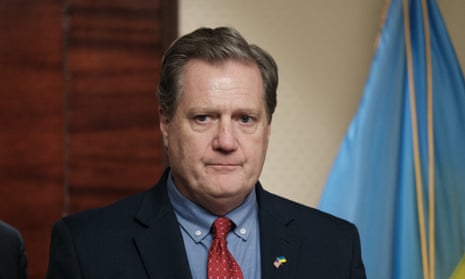The head of the House intelligence committee, Mike Turner, has called for the Biden administration to declassify information on what he called a “serious national security threat”, which was later reported to involve Russian plans to deploy nuclear weapons in space.
In his statement, Turner, an Ohio Republican, gave no details about the supposed security threat.
Talking to reporters at the White House later on Wednesday, the national security adviser, Jake Sullivan, expressed surprise at Turner’s statement saying he was due to meet the “gang of eight” (congressional leaders with special security clearance for classified briefings) on Thursday. But Sullivan did not give any details of the planned meeting.
ABC News and the New York Times cited unnamed sources as saying that the security threat Turner was referring to involved Russia’s potential deployment of a nuclear anti-satellite weapon in space. The New York Times said US allies had also been briefed on the intelligence, which was not deemed to represent an urgent threat, as the alleged Russian capability was still in development.
It is not clear whether the new intelligence alert is connected to a Russian launch on 9 February of a Soyuz rocket carrying a classified defence ministry payload.
“Russia has been conducting several experiments with manoeuvring satellites that might be designed to sabotage other satellites,” Hans Kristensen, director of the nuclear information project at the Federation of American Scientists, said. He pointed out that any such deployment of nuclear weapons in space would violate the 1967 Outer Space Treaty, to which Moscow is a signatory.
“The issue is not so much about an increased nuclear weapons threat per se but that it would increase the threat against other countries’ space-based nuclear command and control assets. It would be highly destabilising.”
Pavel Podvig, an expert on Russian nuclear forces, said: “I am very skeptical (to put it mildly). Unfortunately, it’s impossible to categorically rule out anything these days. But still, I don’t think it’s plausible.”
Kristensen suggested that a Russian threat to put nuclear weapons in space, thus destroying yet another non-proliferation treaty, could be the latest in a long line of Vladimir Putin’s moves designed to add to pressure on the US and its allies to end their military support for Ukraine.
Daryl Kimball, the head of the Arms Control Association, said a nuclear anti-satellite weapon made little practical sense.
“You don’t need a nuclear weapon to blow up a satellite in orbit. All objects in space are so delicate, that you can do something with much less than a nuclear detonation,” Kimball said. “Plus, it’s completely illegal.”
The House speaker, Mike Johnson, said there was no need for panic over the alleged, unnamed threat. He said he was not allowed to discuss classified information but told reporters: “We just want to assure everyone steady hands are at the wheel. We’re working on it and there’s no need for alarm.”
